📖 This is a long post and is best viewed online here.
👆 To get these updates in your inbox, subscribe to Footnotes and Tangents and turn on notifications for War and Peace 2024.
🎧 This post is now available as a podcast. Listen on Spotify, YouTube, Pocket Casts or wherever you get your podcasts.
Welcome to Week 44 of War and Peace 2024
This week, we have read Book 4, Part 3, Chapters 5 – 11.
Everything you need for this read-along and book group can be found on the main War and Peace page of Footnotes and Tangents. There you will find:
The reading schedule with links to daily chat threads for each chapter.
Weekly updates like this one.
Are you enjoying our slow read? I need your help!
This month, I will launch the 2025 slow read of War and Peace. If you have enjoyed reading with us this year, I would love to hear from you. Your feedback will be enormously helpful for new readers deciding whether to join us in 2025. What were your expectations? What was your experience of reading slowly as part of a group? What surprised you? And would you recommend this slow read? If you are happy for me to share your thoughts with future readers, I have started a chat thread for testimonials, or you can send me a DM or email. Thank you so much for your time.
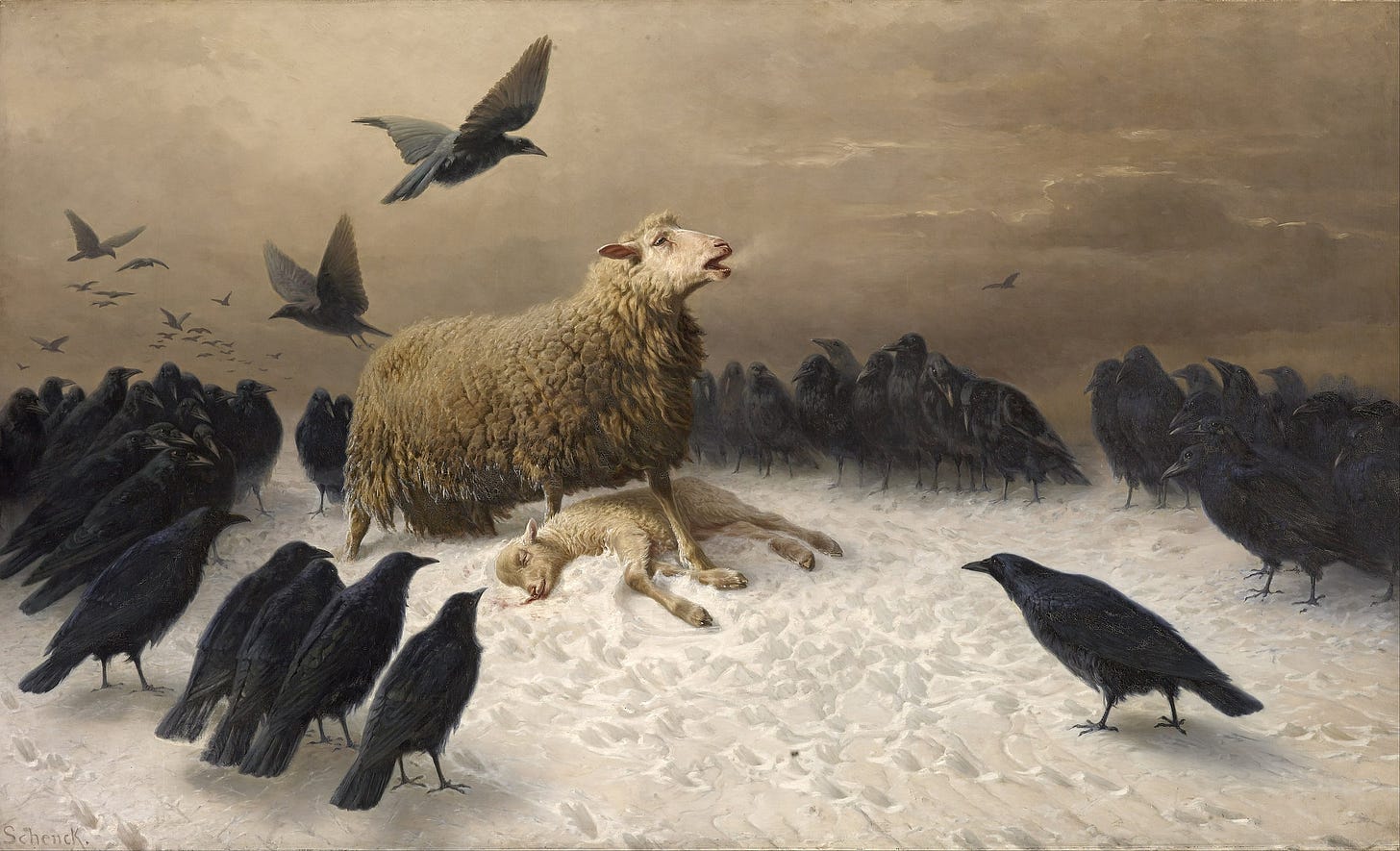
This week’s theme: No More Heroes
Of all the chapters in this great book, this is the one I remember most clearly from the first time I read it.
We are in the winter of this story, the novel is nearly done. We have seen children grow up, men and women change as the world transforms around them. We have cried for characters we despised on the first page, such is the strength of literature and of life.
By the time Denisov and Dolokhov swagger back into the story, I am entranced. In 1,000 pages, Tolstoy has drawn us through a kaleidoscope of human feeling, an encyclopedia of what it means to be alive.
There has been a lot to be angry and ashamed about. Men, incapable of seeing the goodness in themselves and in others. Wars destroying lives; and peace, designing its own cruel punishments for the body and the soul.
But for every shadow, there was the sun: the sky, a tree, a smile. A potato. Granting each of us a second chance. A way out, from war to peace. As long as there is life, there is hope.
We first met Petya as a little boy. And when his brother returned home from battle with his friend Denisov, Petya couldn’t contain his excitement. He charged into their bedroom, wielding one of their swords. “Is it yours?” He asked Denisov.
Last night, while Denisov slept, Petya listened to the sharpening of his own unused sabre. The night sang to a melody full of the richness of life, sometimes solemn, sometimes joyful and triumphant.
He’s afraid of life, as anyone sensitive to it must be. He sees the eye of the monster in the fire burning; the cold edge to Dolokhov’s laugh when he says it would be better to shoot the rabble.
Shoot the drummer-boy in his springtime. Shoot Pierre far from home.
But Petya is the soul of this story. Like Tolstoy, he believes we must be splendid in the dark. We must reach our hand out for the drummer-boy, even when we don’t know what to say. Hope for heroes, while the devils mount.
Come the dawn: a watery light, and the world made visible again.
Come death too soon. Gone joy, gone hope, gone life.
Chapter 5: The Other Tikhon
They interrogate the little drummer-boy, who gives them confused answers. Denisov and the esaul consider their plans while Petya pretends to understand. And then Tikhon Shcherbaty appears, pursued by the French. Tikhon is the bravest and most useful man in their party, who is given all the really difficult jobs, like creeping into the French camp in broad daylight.
Tikhon Shcherbaty was one of the most indispensable men in their band.
Readers with long memories will remember another Tikhon, the faithful servant to the Old Prince Bolkonsky; a man always ready to catch a flying plate.
This Tikhon is no less impressive. Although it is proof of the unforgiving world we have arrived in, that this ‘beast’ and ‘devil’ is also a hero.
And meanwhile, here is our gentle Petya, nodding ‘as if he understood it all, though he really did not understand anything.’
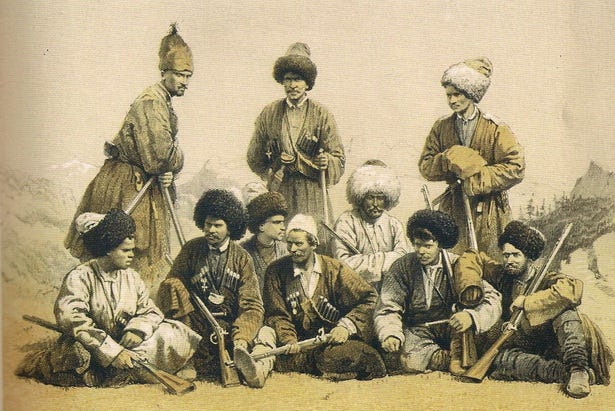
Plastun
'He's our platsun. I sent him to capture a "tongue"'. 'Oh, yes,' said Petya, nodding at the first words Denisov uttered.
Tolstoy puts us in Petya’s shoes, well out of our depth. Denisov is comparing Tikhon to the plastuns of the Black Sea Cossacks: unmounted sharpshooters skilled in tracking the enemy through dense forests. The term derives from the word for ‘sheet’ because they were adept at laying flat and low (as Tikhon demonstrates in the next chapter). The tongue is a captured prisoner who can provide intelligence on the enemy camp.
Chapter 6: A Laughing Matter
Tikhon tells the party about how he captured a Frenchman. He decided the captive wasn’t good enough so went in search of another and was almost captured himself. Petya realises Tikhon killed the Frenchman and threw away his boots. News arrives that Dolokhov is coming and all is well.
He looked round at the captive drummer-boy and felt a pang in his heart. But this uneasiness lasted only a moment.
I imagine Petya and the drummer-boy being a similar age. Only fate separates them. Like the Frenchman who Pierre fought at Borodino; just humans on opposite sides of a war.
Tikhon with his foolish grin and missing tooth: he makes everyone laugh. Until you remember it is no laughing matter.
Tomorrow, Petya thinks he cannot afford these human feelings.
What is your impression of Tikhon? Why has Tolstoy introduced this character now?
Two Petyas and two peasants
When the fit of laughter that had seized him at Tikhon's words and smile had passed and Petya realized for a moment that this Tikhon had killed a man, he felt uneasy. He looked round at the captive drummer-boy and felt a pang in his heart. But this uneasiness lasted only a moment. He felt it necessary to hold his head higher, to brace himself, and to question the esaul with an air of importance about tomorrow's undertaking, that he might not be unworthy of the company in which he found himself.
There are two Petyas in this story: Pierre Bezukhov and Petya Rostov. They both encounter peasant soldiers, Pierre is imprisoned with Platon Karataev, and Petya meets Tikhon Shcherbaty.
Tikhon and Platon could not be more different. Platon’s pacific gentle nature contrasts with Tikhon’s casual violence. Yet both are unreflective people who live in the moment, rooted to the earth beneath their feet. Platon has his earthy potatoes; Tikhon crawls with his stomach touching the soil.
These peasant soldiers affect our Pierres differently. Bezukhov finds himself laughing because Platon has revealed life’s meaning in his feet and a simple meal. Petya Rostov joins in with Tikhon’s laughter, though it makes him uneasy. He braces himself not to think too hard about what he must do.
Platon and Tikhon make our two Petyas stop worrying and start laughing. But while Platon offers Pierre an inner peace, Tikhon shows Petya the way to an outer war, to kill and be killed.
Chapter 7: Youthful Virtues
Since Petya had left home, he had been impatient to do something truly heroic. Despite instructions to the contrary, he stayed with Denisov’s party and asked to be given some opportunity to prove himself. He hands out knives, flints and raisins, and goes to comfort the French drummer-boy. He holds the boy’s hand, not daring to say to him the thoughts in his mind.
There were many things Petya wanted to say to the drummer-boy, but did not dare to. He stood irresolutely beside him in the passage. Then in the darkness he took the boy's hand and pressed it.
For me, this is one of the most moving chapters in the novel.
Everything is all of a piece: Petya wants to be a grown man, but everything he does has a childish purity. Loving everyone; giving away his raisins and flints; holding the boy's hand in the dark, and not knowing what to say.
What would you say to Vincent? What would you say to Petya?
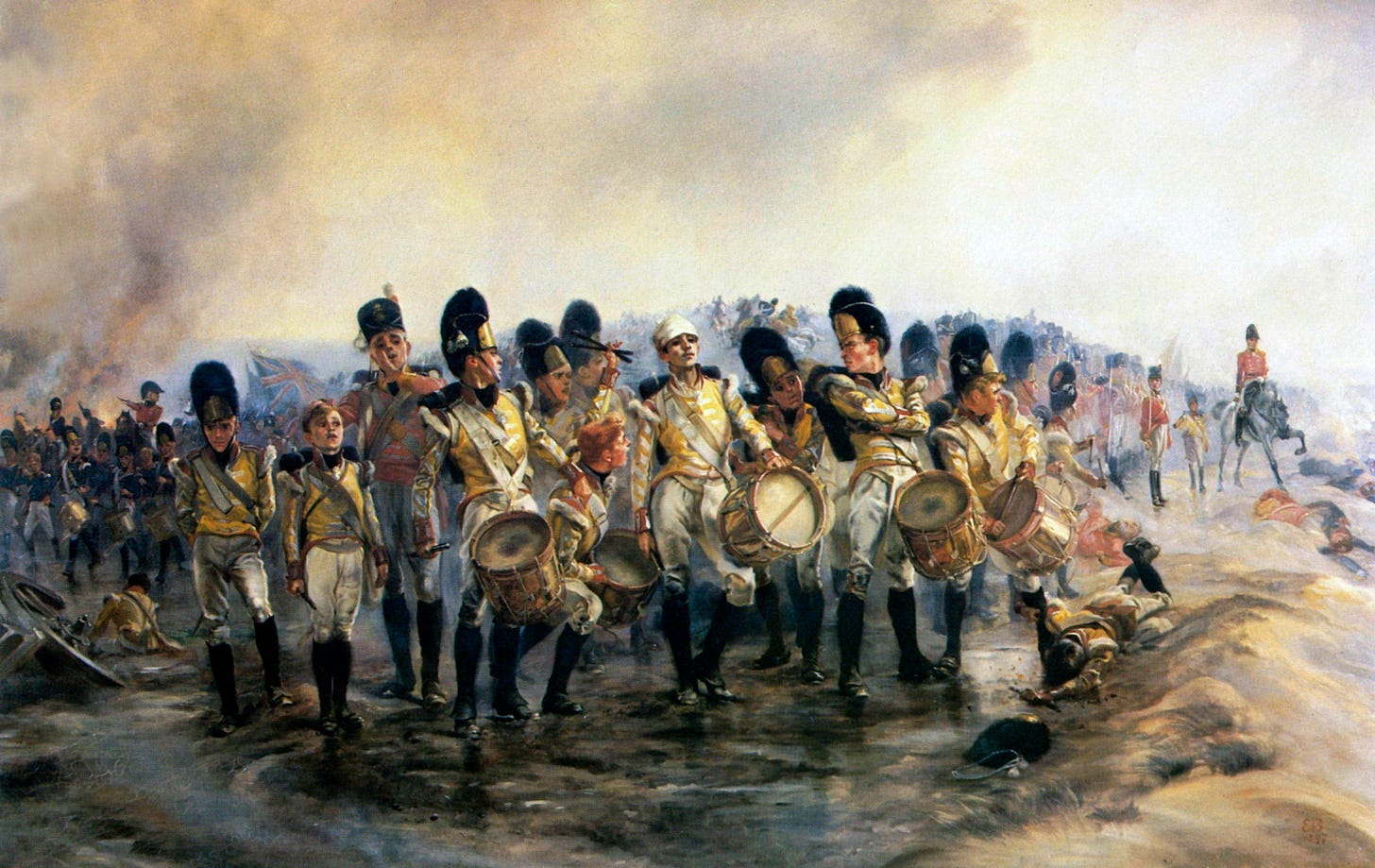
Vincent Bosse
The French drummer-boy’s name is interesting. It is derived from the Latin vincere, to conquer, an ironic name for a prisoner from the vanquished Grande Armée. So the Cossacks have changed it to Vesénny: vernal, youthful and springlike.
This is a beautifully sad transformation. Especially given the root of Rostov’s name: to grow. These are two boys in their springtime. Vincent’s life has been re-imagined in a graphic novel by the Belgian artist Simon Spruyt. Spruyt imagines Vincent telling his life story to Leo Tolstoy and you can watch the artist painting one of his pictures of Vincent here:
Further reading:
Chapter 8: What Should Be Done
Dolokhov arrives, smart and clean-shaven. He insists everything must be done accurately, and Petya volunteers to go with him to the French camp in disguise. Denisov objects and the two officers argue about the rights and wrongs of killing prisoners. Petya resolves to go with Dolokhov regardless of the risks.
If grown-up, distinguished men think so, it must be necessary and right.
Dolokhov is back and is talking about killing prisoners. He thinks Denisov is either a fool or a hypocrite for trying to be ‘chivalrous’ when everyone knows the fate of prisoners.
It's chilling stuff, made worse by Dolokhov saying he likes ‘to work accurately’. I want to run a mile from this man.
But poor Petya sees a grown man in command of himself. He sees a hero; someone to follow.
Who do you agree with, Denisov or Dolokhov? Should Denisov try harder to protect Petya?
Chapter 9: Dare-devil Deception
Dolokhov and Petya don their disguises and ride into the French camp. Petya is impressed by Dolokhov’s calm as he asks about the size of the French detachment. Dolokhov says it would be better to shoot the Russian prisoners. They leave and Dolokhov gives Petya instructions for Denisov. Overcome by the dare-devil antics, Petya kisses Dolokhov and calls him a hero.
‘You are such a hero! Oh, how fine, how splendid! How I love you!’
A nail-biter of a chapter! We expect nothing less from Dolokhov and how he delivers! And seeing the subterfuge from Petya's perspective makes it all the more tense.
I half expect Petya to betray them. He's so nervous, and can hardly remember his French.
But the worst is when Dolokhov says he'd have shot the Russian prisoners, mirroring his conversation with Denisov, accompanied by that strange chilling laugh.
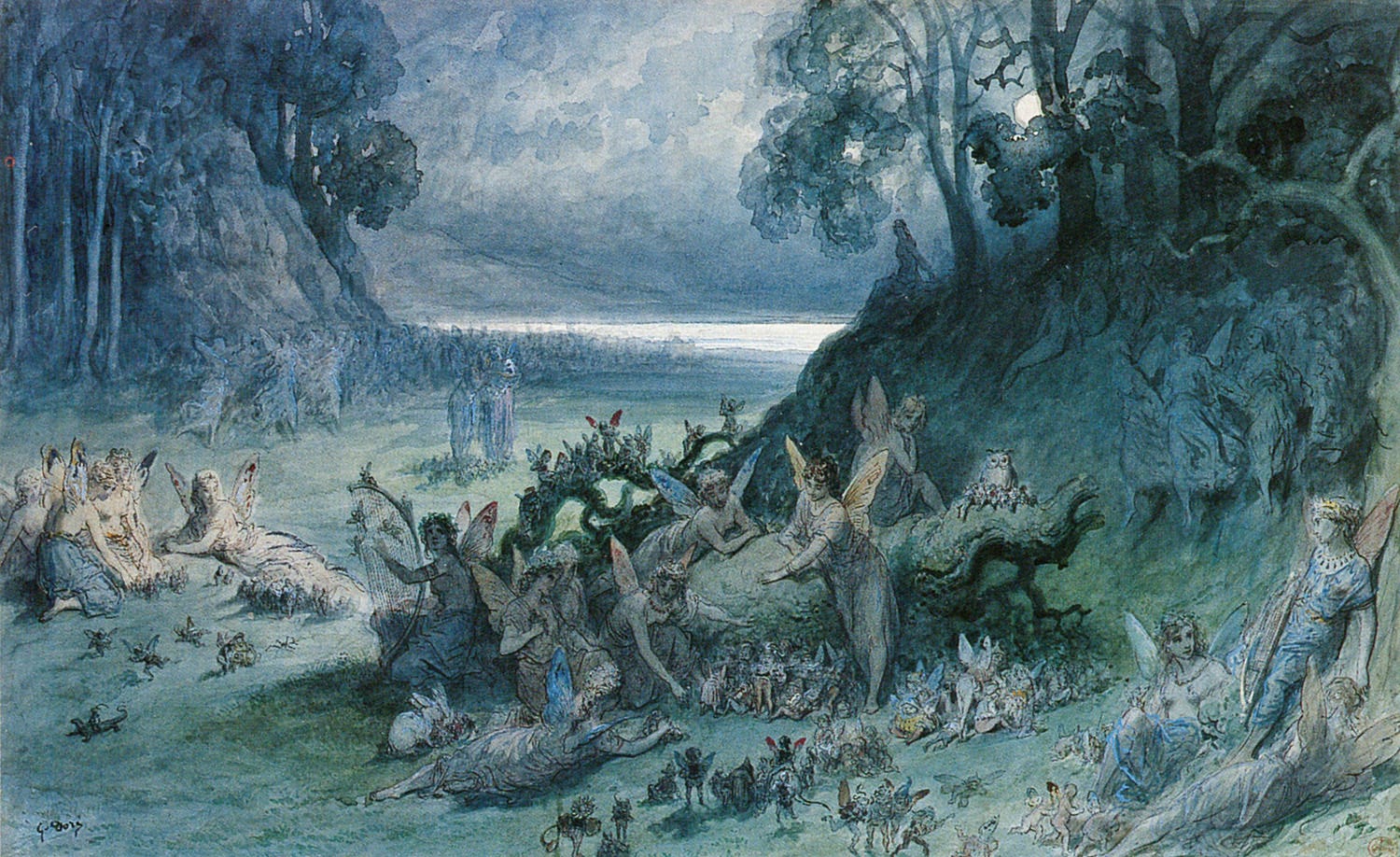
Chapter 10: Fairy Music
Petya returns to Denisov’s camp. He is too excited to sleep, and he asks a Cossack to sharpen his sabre, which has never been used. He nods off, feeling that he is in a fairy kingdom where everything is possible. He conducts the sounds of the forest like an orchestra. The Cossack wakes him, his sabre sharpened and ready to cut a Frenchman in two. Denisov gives the order to get ready.
He was in a fairy kingdom where nothing resembled reality. The big dark blotch might really be the watchman’s hut or it might be a cavern leading to the very depths of the earth. Perhaps the red spot was a fire, or it might be the eye of an enormous monster. Perhaps he was really sitting on a wagon but it might very well be that he was not sitting on a wagon but on a terribly high tower from which, if he fell, he would have to fall for a whole day or a whole month, or go on falling and never reach the bottom.
We have been here before. Nikolai travelled through a fairy kingdom, the Christmas he fell in love with Sonya for a second time. And Nikolai couldn't sleep for excitement before Austerlitz, and he was the worse for it.
Petya on the wagon, imagining himself falling forever, recalls Pierre crouched beside another wagon: laughing and looking up at the infinite sky. One had found the real world beneath and above him; the other is falling forever through a fantasy.
Petya and the drummer-boy sleep and dream of another time, when they are not at war. Harmonious music beneath fairy stars. If only Petya could stay there in that place, and not wake to first light and a sharp knife.
Have you experienced anything similar to Petya’s night in fairyland?
And what, if anything, do these visions mean?
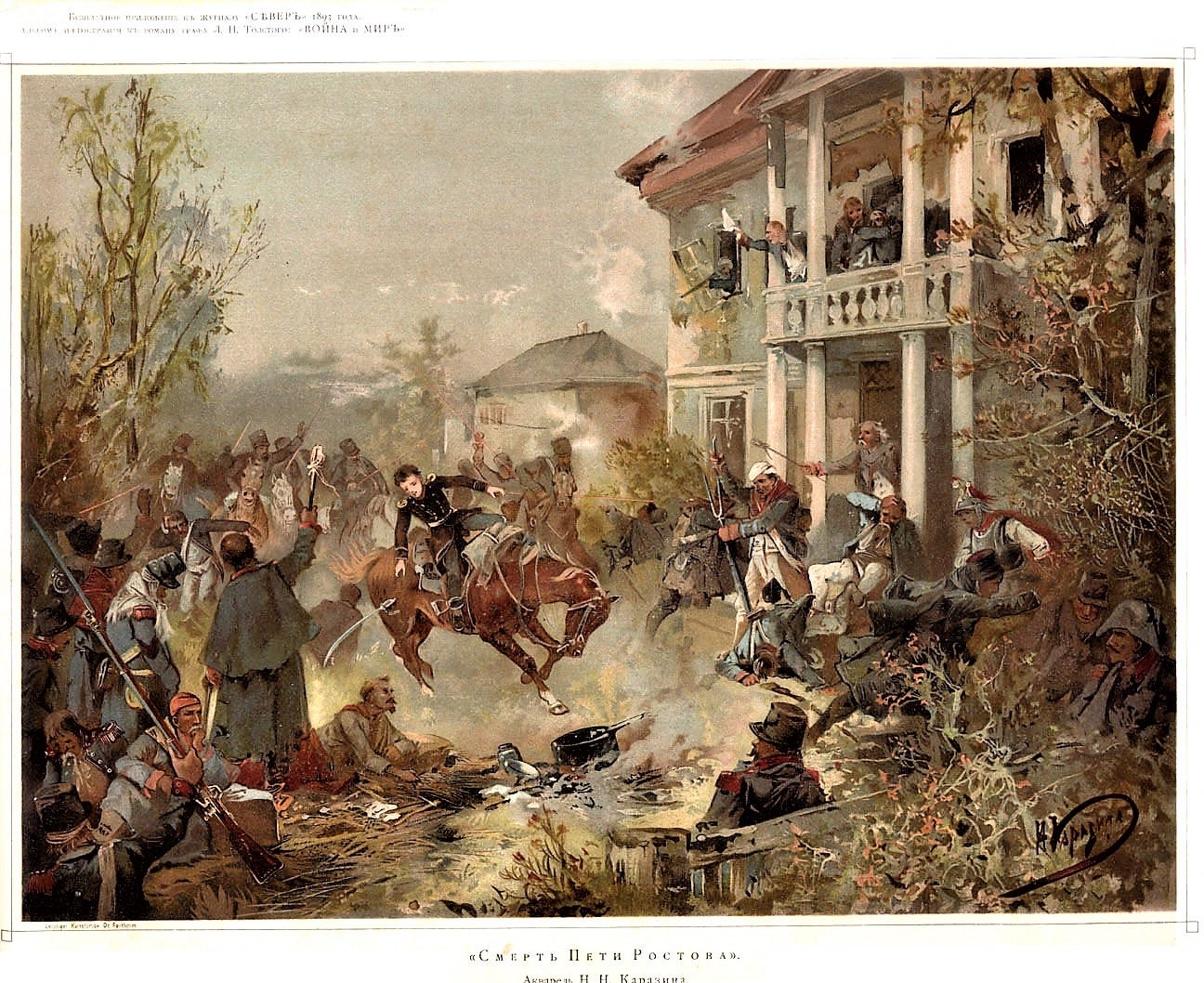
Chapter 11: Finished
Denisov tells Petya to obey him and stay out of trouble. But once the signal is given, Petya rushes forward in search of action. The French are killed, flee or surrender, but not before Petya is shot in the skull and falls from his horse. Dolokhov says it is finished; Denisov howls like a dog. Petya is killed and his namesake, Pierre Bezukhov is rescued from among the Russian prisoners.
Denisov • Dolokhov • Pierre • Petya
‘I am used to something sweet.’
This is one of the hardest chapters to read. Petya's life has just begun. He's been riding away from his childhood into the line of fire. Unlike Nikolai, Andrei or Pierre, he will not live long enough to learn anything from this war.
Nothing brings home the senselessness of all this more than Petya's fate. All that good spirit and love of life wasted. And we feel Denisov’s pain keenly. Surely he will feel responsible for this and struggle to forgive himself?
And Dolokhov with a cold smile rescues Pierre, the man he once tried to kill.
Flowers of the Forest
They shall grow not old, as we that are left grow old:
Age shall not weary them, nor the years condemn.
At the going down of the sun and in the morning
We will remember them.
From ‘For the Fallen’ by Laurence Binyon.
The French invasion of Russia in 1812 is thought to be one of the most lethal military operations in history. Somewhere in the region of one million people were killed within six months.
In War and Peace, Andrei and Petya are the recognisable faces behind that staggering statistic. And Petya, most of all, exemplifies the terrible waste of war. Here is a boy with so much life, his raisins and his flints, and so much ahead of him. Here is a boy with a family waiting for him back home. A family we know and love.
I think because of the forest setting of these chapters, and the sense of lament, a song from another time slipped into my head:
Flowers of the Forest is a Scottish folk tune that remembers the fallen at the Battle of Flodden in 1513. This Scottish lament is still used by the British and Canadian armed forces in memorial services.
But what of the little drummer boy?
Drums have been part of warfare for centuries. In the 19th Century, boys who were too young to enlist and fight became drummer boys and fifers. One of history’s most famous and notable drummer boys was Joseph Bara. Like Vincent, he was French. He was killed aged 13 by pro-Monarchist forces in the revolutionary War in the Vendée. He was considered a martyr, his death mythologised and used as propaganda in the National Convention, where it was said ‘only the French have thirteen-year-old heroes’.
In contrast, Tolstoy’s Vincent Bosse is not a hero. He is a victim of war. Tolstoy does not glamourise his presence, although he lets Vincent’s captors consider him with sad tenderness. And yet, if Dolokhov had his way, Bosse would not be alive. It is only an accident of fate that he falls into the sentimental hands of Vaska Denisov.
Eglantyne Jebb, social reformer and founder of Save the Children, said, ‘All wars, whether just or unjust, disastrous or victorious, are waged against the child.’
It seems deeply appropriate that a book that stands for life and against war should draw attention, in its final stages, to the fate of two boys, one French, the other Russian, both victims of man’s inhumanity.
Thank you for reading
Thank you for reading and joining me on this slow read of War and Peace.
Before I go, a reminder that I am looking for testimonials to recommend this read-along to readers joining us in 2025. If you can help, just drop me a DM on Substack, send me an email or leave a comment below. And if you have enjoyed this post and found it helpful, please consider leaving me a tip over on Stripe. These donations always make my day and remind me that this project is worthwhile and finding a good home.
And that’s all for this week. I love to read your thoughts in the comments and the chat threads. Have a great week, and I’ll see everyone here next Sunday for more War and Peace 2024.


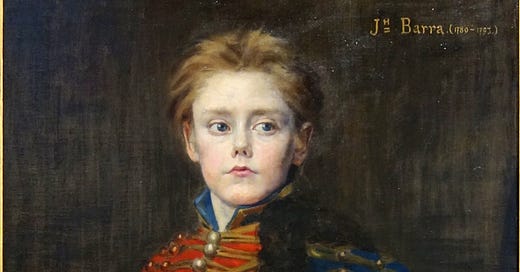


Simon, thank you for the reminder about Petya’s excited sword wielding when he was a boy. I had forgotten. The way Tolstoy ties these things together is so masterful and your summaries are beautiful and very insightful.
I found myself frustrated with Petya in these chapters. Couldn’t he see he was rushing head first into danger not glory? No. And nor could Andrei with his flag or Pierre in his wandering at Borodino. And though I am not a man who hungers for glory, in what ways have my own desires to be recognized and respected driven me to nonsensical actions despite the cautioning of peers and mentors? I may not be running to the front lines but I do spend far too much time in front of a computer screen overworking and subconsciously waiting for the applause of some invisible audience. It’s not a bullet to the head but it’s a death all the same. This section will sit with me.